EU and FAO launch 4 m Euro initiative to improve efficiency, sustainability of paddy farming
- Program targets 71,000 smallholder paddy farmers and 1,200 paddy seed farmers across 7 districts
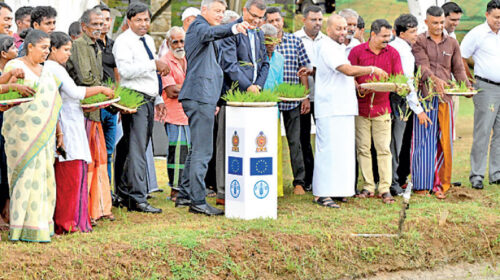 The Food and Agriculture Organisation of the United Nations (FAO) together with the European Union (EU) on Saturday launched a new program to strengthen food security in Sri Lanka by boosting the productivity and sustainability of the paddy cultivation sector.
The Food and Agriculture Organisation of the United Nations (FAO) together with the European Union (EU) on Saturday launched a new program to strengthen food security in Sri Lanka by boosting the productivity and sustainability of the paddy cultivation sector.
The 4 million Euro (approximately Rs. 1.5 billion) initiative funded by the EU was initiated at an event held at the Bataatha Agro Technology Park in Hambanthota.
Implemented by FAO with the support of the Ministry of Agriculture and the Mahaweli Authority, the program targets 71,000 smallholder paddy farmers and 1,200 paddy seed farmers across seven districts including Polonnaruwa, Badulla, Ampara, Matale, Puttalam, Kurunegala and Hambantota districts who were severely impacted by the recent economic crisis.
Speaking at the event, which saw the official start of the farmer field schools EU Ambassador to Sri Lanka Denis Chaibi said: “With this new action, we want to help farmers not only to grow more, but most importantly to grow better so that they can increase their production and incomes, but also protect the environment around them. We hope that together with FAO and the Government of Sri Lanka we can gradually promote a transition towards greener and climate-smart agriculture. Transition that produces sufficient amount of food, while protecting the planet and its people.”
The recipient farmers will receive material and technical support to transition from traditional cultivation methods into climate-smart, modern farming techniques. The eligible paddy farmers cultivating up to 0.5 ha of land will receive 50 kg urea fertiliser and necessary tools to enhance efficiency of fertiliser use. 3,820 tonnes of urea fertiliser procured by the program were already handed over to the Ministry of Agriculture to be distributed among selected smallholder paddy farmers and paddy seed farmers.
Paddy seed farmers supported through the program will also receive locally produced, high quality paddy seeds alongside material support such as parachute trays to improve efficiency and profitability of cultivation methods. Furthermore, all recipients will be enrolled in farmer-field schools to improve knowledge sharing on modern techniques such as the Integrated Plant Nutrient Management (IPNM) strategy to boost efficiency and reduce dependency on the use of chemical fertiliser.
Agriculture Minister Mahinda Amaraweera expressed his appreciation to the FAO and the EU for the implementation of a holistic program aimed at improving the sustainability of Sri Lanka’s paddy sector. “Our paddy farmers underwent significant challenges over the past few years. This support we received from FAO and the EU is a testament to their perseverance during the tough times, for which we are thankful. These inputs and knowledge sharing will no doubt elevate the quality of rice production and the livelihoods of Sri Lankan paddy farmers.”
FAO Representative in Sri Lanka Vimlendra Sharan said: “This program marks an important milestone in FAO’s work in Sri Lanka over the past year – the shift back into development from the emergency response. We are grateful for the support we have received from the EU to implement this program, which aims to address some of the longstanding concerns in the local paddy sector, to reach better production, leading to better nutrition, a better environment and improve food security for all Sri Lankans.”
EU and FAO said they will continue to work closely with the Government of Sri Lanka and key partners to support the recovery of the agriculture sector while building resilience and sustainability into the sector to increase yield and profit for smallholder farmers as the sector recovers.
Japan, UNDP launch fresh programs to boost socio-economic recovery
- $ 3.8 m initiative via home-based agriculture and energy security interventions
- 58,000 women and youth will directly benefit from these projects, while indirectly impacting over 132,000 vulnerable community members from the North-Central, North-Western and Eastern provinces
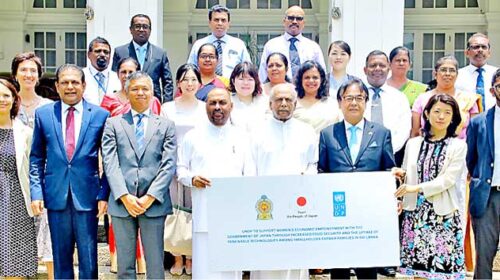 The Government of Japan and the United Nations Development Program (UNDP) yesterday launched a new initiative to strengthen socio-economic recovery via home-based agriculture and energy security measures.
The Government of Japan and the United Nations Development Program (UNDP) yesterday launched a new initiative to strengthen socio-economic recovery via home-based agriculture and energy security measures.
The $ 3.8 million (Rs. 1.17 billion) initiative supports improvement of women’s economic wellbeing for smallholder farmer families in Sri Lanka. It was launched in the presence of Prime Minister Dinesh Gunawardena, Japanese Ambassador Mizukoshi Hideaki, UNDP Resident Representative Azusa Kubota, JICA Chief Representative Tetsuya Yamada, Agriculture Minister Mahinda Amaraweera, Power and Energy Minister Kanchana Wijesekera, senior government officials and development partners.
The ongoing socio-economic crisis has had serious impacts on the agricultural sector in Sri Lanka. The rising energy costs and evolving climate change impacts have further exacerbated due to the situation. The initiative launched yesterday aims at addressing these issues.
It will support vulnerable smallholder farming families in the dry zone districts, namely North-Central, North-Western and Eastern provinces, with a focus on women’s economic empowerment and adoption of green agricultural technologies.
Funded by the Japanese Supplementary Budget (JSB) and working together with the Government of Sri Lanka and relevant stakeholders, the intervention aims to achieve its objectives through two projects; the first focusing on diversifying livelihoods and introducing entrepreneurship programs, targeting women-led MSMEs. The second aims to strengthen energy and food security, through the revival of the rural agricultural economy by providing access to innovative markets, value and supply chain improvements along with the adoption of modern, green agricultural technologies which will increase productivity and efficiency.
A total of 58,000 women and youth will directly benefit from these projects, while indirectly impacting over 132,000 vulnerable community members from the North-Central, North-Western and Eastern provinces of Sri Lanka.
Prime Minister Gunawardena said: “Government of Sri Lanka appreciates the continuous support extended by the Government of Japan and the United Nations Development Program towards the country’s efforts to recover from the socioeconomic crisis. We believe this is a significant step towards creating a food and energy secure Sri Lanka, both vital sectors to the fabric of the country’s economy.”
Highlighting Japan’s commitment to the people of Sri Lanka in crisis recovery efforts, Ambassador Mizukoshi said: “Japan has been working together with the Government of Sri Lanka and relevant UN agencies for economic and social empowerment of women in Sri Lanka, including the formulation of National Action Plan for Women, Peace and Security. These new projects will provide practical means to uplift the lives of vulnerable communities. Especially, we recognise the special needs of women-headed households in conflict-affected areas. It is a great opportunity to create positive synergy with UNDP’s expertise and JICA’s technical assistance for supporting livelihood and vulnerable communities.”
UNDP Resident Representative Kubota said: “These are times when multiple-solutions through multiple-partnerships are required because we are faced with compounding and complex challenges. I am grateful for the commitments demonstrated by a wide range of actors present today. We must join hands to address the needs of the most vulnerable and affected segments of the society – particularly women-headed households. And investing in them will have visible, long-term benefits for the families and communities.”
India-Lanka ferry service is still on rocky seas
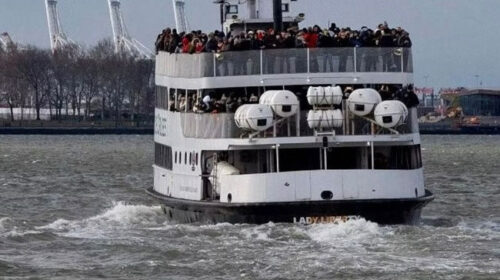 The chances of having a ferry service between India and Sri Lanka by the end of this year seem likely provided both India and Sri Lanka are clear about the details
The chances of having a ferry service between India and Sri Lanka by the end of this year seem likely provided both India and Sri Lanka are clear about the details
Replying to the demands for grants for the departments concerned in the Tamil Nadu Assembly early this month, Highways and Minor Ports Minister E V Velusaid that efforts are underway to launch a short ferry service between Rameswaram and Sri Lanka in a few months’ time. The idea is to link Rameswaram and Talaimannar first, covering a distance of 50 kilometres. This will be followed by another ferry service, linking Rameswaram and Kankesanthurai (KKS),a distance of 100 km.
Accordingly, the Tamil Nadu Maritime Board has sent a detailed project report to the Union government for approval, the minister said.“The Rameswaram minor port does not have facilities. The State has been in touch with the Union Government, which is keen on starting the project and is ready to fund the development of the port, costing INR10-15 crores, to launch the ferry service,”news reports have since quoted Tamil Nadu officials. Accordingly, the Ministry of External Affairs (MEA) and the Union Ministry of Shipping and Waterways have agreed to the project, the report claimed. “The ferry can go at a speed of 30 knots between Rameswaram and Talaimannar,” the Times of India report said. “With a 150-passenger seating capacity, the travel time will be one and two hours to Talaimannar and Kankesanthurai, respectively. The sheltered waters of Palk Bay would aid the project”, the report added.
The Union and State governments in India, and also Sri Lanka are on the same page as regards launching ferry service,” an official told the newspaper.
This followed a recent video conference involving officials of the Sri Lankan High Commission in New Delhi, the MEA and India’s Ministry of Port, Shipping and Waterways, and also the Tamil Nadu Government, according to the news report. The Union Government will accordingly float ‘Expression of Interest’ to identify operators to operate from Rameswaram, it added. “The state government is interested in readying the entire project in six months. The construction of the Rameswaram jetty is the only bottle-neck. The Union and State governments in India, and also Sri Lanka are on the same page as regards launching ferry service,” an official told the newspaper.
Inherent contradiction
However, an inherent contradiction is discernible in the official positions of the Tamil Nadu government and that of its Sri Lankan counterpart. It relates not only to the chosen route but also the timing of the ferrylaunch.
According to NimalSiripala de Silva, Sri Lanka’s Minister of Shipping, Ports and Aviation, the ferry service would be launched not on the routes mentioned by the Tamil Nadu minister, but on the Kankesanthurai-Karaikal route, the latter being an enclave of the Union Territory of Puducherry. It will be launched as early as 29 April this year, a Sri Lankan Shipping Ministry statement said further.
As discussed between the Minister De Silva and India’s MEA on 26 March, two immigration and emigration offices, one each in Kankesanthurai and Karaikal, would be set up for this purpose, and preliminary measures have already commenced in this regard. The immigration office at the KKS jetty and the port are fully operational and ready to start, Minister De Silva said. The minister also clarified that neither government would provide the ferry to operate the service. Instead, India’s MEA will float tenders for operators with boats having a carrying-capacity of 150 passengers to operate the service. Considering that traders from Tamil Nadu and Sri Lanka’s North and East are the targeted segment, the baggage allowance, put at 100 kgper passenger, will be an attraction. The one-way ticket charge is also proposed at an affordable US$ 50 per passenger, though it would be for the selected ferry operator to fix the ticket-cost.
Restoring ‘Boat Mail’
Earlier, at a meeting with MEA’s Joint Secretary (IOR) Puneet Agrawalin Colombo in December last year, Minister De Silva requested early commencement of the ferry service.At the meeting, Sri Lanka sought increasing the quantum of India’s concessional loan for developing the Kankesanthurai Port, attributing the higher cost to fluctuation in the price of construction material. It was over and above the US$ 45.27-million Indian assistance granted in 2018 for upgrading the KKS Harbour into a commercial port and for strengthening the country’s efforts to become a regional maritime hub.Public sector Dredging Corporation of India has already deepened the KKS Harbour. India has also funded the dredging of the approach channel, with the larger cargo ferries in the future in mind.
The one-way ticket charge is also proposed at an affordable US$ 50 per passenger, though it would be for the selected ferry operator to fix the ticket-cost.
At the time, the choice of destination on the Indian side had shifted from Karaikal to Puducherry, after it was found that the private port at the former site was facing bankruptcy proceedings. Ferry operators also reportedly indicated that the longer trip to Puducherry could cause sea-sickness among passengers unused to sea-travel. Hence, the decision was to run the ferry service reportedly between Kankesanthurai and Nagapattinam in Tamil Nadu, not far away from Karaikal.
However, the bankruptcy proceedings seems to be in the concluding phase, with one private operator, Adani Group, likely to take over from another, Marg, in the none-too-distant future. This could then entail the possibility of the Sri Lankan minister’s announcement coming true, though not by the month-end. Whichever the Indian destination that New Delhi finalises, as long as the clearances and works are completed in time, the chances are bright for the ferry service commencing operations at the end of the north-east monsoon cyclone season by the year-end.
The Sri Lankan statement of December also quoted Indian official Agarwal as underlining the appropriateness of reviving the long-forgotten passenger ferry service between Dhanushkodi in Sri Lanka and the temple-town of Rameswaram in Tamil Nadu. Minister De Silva agreed to the proposal and also emphasised that the Sri Lanka railway service can also be connected with the passenger ferry service, and thus revive the pre-Independence, Colombo-Chennai train travel by the ‘Boat Mail’, with an intervening ferry trip from Danushkodi / Rameswaram to Talaimannar in Sri Lanka.
The bankruptcy proceedings seems to be in the concluding phase, with one private operator, Adani Group, likely to take over from another, Marg, in the none-too-distant future.
The ‘Boat Mail’was diverted from original Danushkodi point to Rameswaram after a train full of passengers and also the railway station and the pier were all washed away in a cyclone in 1964. The Rameswaram-Talaimannar service also went on long hibernation in 1984, after sea-based Tamil militancy of the LTTE’s ‘Sea Tigers’ made those waters unsafe.
Trade and tourism
According to the recent Times of India report, there are also plans to include partial cargo service in the next phase of the Rameswaram-centred ferry service. Subsequently, cargo services will be allowed from Rameswaram to Sri Lanka with 300-500 tonne capacity. “The State Government has already sent a detailed proposal worth INR600 crore to have a bigger facility to the Union ministry of shipping and the discussion is going on,” the official said.
Sri Lanka is steadfast with Kankesanthurai as their entry port for the ferry service to Tamil Nadu. The Indian port-of-call is yet to be finalised by the Government of India and Tamil Nadu through consultations. Going by the Tamil Nadu minister’s statement in the State Assembly, some basic issues need to be sorted out and for good—and early—so that whatever the route finalised in consultations with Sri Lanka, it should become operational as early as possible.
Independent of all this, there is a huge scope for improving trade and tourism between the two countries, including religious tourism. As is known, ferry service works out cheaper than air travel, and there is also a limited adventure in sea-travel, especially with short cruise trips.Budget pilgrims from Tamil Nadu and the rest of Indiacan visit prominent Hindu places of worship, namely, the KeerimalaiNaguleswaram temple, and the Kathirgamam or Kataragama temple down South, which is of religious significance to both Hindus and Buddhists. That is also when budget tourist operators enter the scene.
Going by the Tamil Nadu minister’s statement in the State Assembly, some basic issues need to be sorted out and for good—and early—so that whatever the route finalised in consultations with Sri Lanka, it should become operational as early as possible.
Likewise, pilgrims from Sri Lanka will have easy access to Velankanni church, Nagore dargah, Tirunallar Saneeswaran temple and other places of religious importance in the Cauvery delta districts, which are dotted with other Hindu temples all across, with easy access to Madurai Meenakshi Amman temple and Palani Murugan temple. Budget pilgrims from Sri Lanka’s majority Buddhist community can also take the ferry service to travel all the way up to Bodh Gaya, Sarnath and other religious centres, and also Lumbini, the birth-place of Lord Buddha in Nepal.
Incidentally, Sri Lanka’s Sinhala-Buddhists are also ardent devotees of Lord Venkateswara in Tirupati. As may be recalled, Buddhist temples in Sri Lanka invariably have separate shrines for Lord Ganesha and Lord Vishnu. In turn, all these can then help the revival of the Boat Mail, with Indian railways considering the extension of it all the way to Bodh Gaya and Sarnath, apart from Buddhist pilgrim centres and other places of tourist interest, en route.
https://www.orfonline.org/expert-speak/india-lanka-ferry-service-is-still-on-rocky-seas/
Civil Society Collective calls on diplomatic missions to ensure LG polls are held
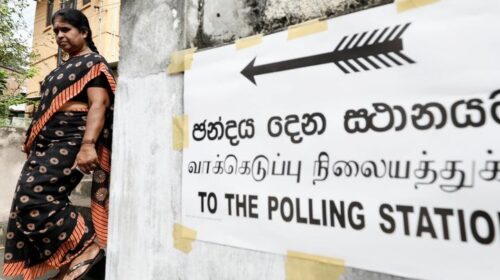 The Civil Society Collective for Protecting the Franchise has sought the support of Diplomatic Missions with regard to their call to hold the 2023 Local Government (LG) election on time, in a bid to protect democracy.
The Civil Society Collective for Protecting the Franchise has sought the support of Diplomatic Missions with regard to their call to hold the 2023 Local Government (LG) election on time, in a bid to protect democracy.
Issuing a statement in this regard, the collective highlighted that failing to hold the LG polls in a timely manner would have serious implications for democracy and governance.
“It would mean that the constitutional right to elect representatives at the local level would be compromised. It will set a dangerous precedent and impair the democratic process”, the statement read.
They further explained that not holding the election using a lack of finances as an excuse could ‘open the door for using such flimsy pretexts for postponing Parliamentary and Presidential elections’, highlighting that this practice , if allowed, will wrongly incentivize leaders who are inclined to not hold elections till it is beneficial for them.
Further emphasszing the adverse effects the postponement of the LG polls has had not only on the country’s democracy but also on its institutions, the Civil Society Collective for Protecting the Franchise called upon Sri Lanka’s international partners to closely monitor the situation, and to ensure that the election is held in a timely manner.
They also urged these international institutions to highlight the importance of an election for the country’s stability and economic recovery.
“It is critical to remain steadfast in advocating for the elections to be held on schedule, and to ensure that the government adheres to the established legal framework. This will serve to preserve the democratic principles upon which Sri Lankan society is founded and to safeguard the right to elect our representatives”, the collective said in this regard.
Below is the relevant statement issued by the Civil Society Collective for Protecting the Franchise;
Civil Society Collective – Joint Statement (English) by Adaderana Online on Scribd
Sri Lanka to raise duty-free allowance for migrant workers to encourage remittance
 COLOMBO, April 3 (Xinhua) — Sri Lanka is set to increase duty-free allowances for migrant workers at the airport starting May in order to encourage remittance, Minister of Labor and Foreign Employment Manusha Nanayakkara said on Monday.
COLOMBO, April 3 (Xinhua) — Sri Lanka is set to increase duty-free allowances for migrant workers at the airport starting May in order to encourage remittance, Minister of Labor and Foreign Employment Manusha Nanayakkara said on Monday.
The increase will be based on the amount of money remitted by the workers, Nanayakkara said during a media briefing.
Under the new scheme, there will be five categories of concessions.
For people having remitted 2,400-4,799, 4,800-7,199, 7,200-11,999, 12,000-23,999 and 24,000 U.S. dollars or more, they will be eligible for an additional duty-free allowance of 600, 960, 1,440, 2,400, and 4,800 U.S. dollars, respectively, when shopping at the airport, according to the minister.
The concessions will be available to anyone who has sent the mentioned amount of money through official channels to the country within a year, the minister said.
He added that no tax will be charged on foreign worker remittances and money held in banks in the form of foreign exchange.
Migrant workers’ remittance is one of the main sources of foreign exchange for the South Asian country.
http://www.china.org.cn/world/Off_the_Wire/2023-04/03/content_85209507.htm
Enditem
CPA Statement on the Anti-Terrorism Bill – 2023
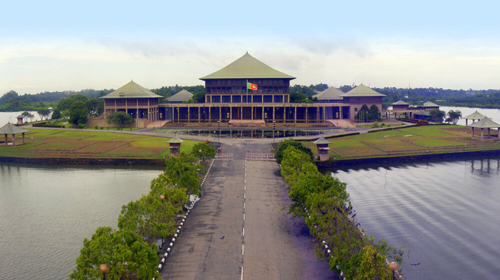 The Centre for Policy Alternatives (CPA) observes that the Government published an ‘Anti – Terrorism Bill’ in the Gazette, on the 22nd of March 2023. This Bill seeks to abolish the Prevention of Terrorism Act (PTA) and introduce an Anti-Terrorism Act. Such legal reforms must be studied in the context of the abuse of the PTA and Emergency Powers carried out by consecutive Presidential regimes, with the present draft providing broad powers to the executive with limited checks and balances. CPA notes that the present Bill requires serious attention, especially when authorities have used security laws to target minorities, critics and protesters, entrenching a culture of torture and impunity in Sri Lanka. CPA reiterates that law reform alone cannot achieve far reaching change in the absence of a genuine political will to change the culture of dehumanising treatment of persons under the guise of counter-terror. In this initial comment on the proposed Anti- Terrorism Bill, CPA observes that the Bill bears significant similarity to the Counter – Terrorism Bill (the 2018 CTA) that was Gazetted in 2018, but subsequently never passed by Parliament. However, the new Bill contains several offences that were not a part of the 2018 CTA, some of which raise serious concern for the freedom of expression, potentially giving the State an additional tool to crack down on dissent and criticism. One improvement in the Bill is that confessions made by suspects in detention to a Police officer are no longer admissible in evidence – a general principle in the ordinary law, for which an exception was made in the PTA. The admissibility of confessions made in custody created a culture of ‘forced confessions’ leading to systemic injustices.
The Centre for Policy Alternatives (CPA) observes that the Government published an ‘Anti – Terrorism Bill’ in the Gazette, on the 22nd of March 2023. This Bill seeks to abolish the Prevention of Terrorism Act (PTA) and introduce an Anti-Terrorism Act. Such legal reforms must be studied in the context of the abuse of the PTA and Emergency Powers carried out by consecutive Presidential regimes, with the present draft providing broad powers to the executive with limited checks and balances. CPA notes that the present Bill requires serious attention, especially when authorities have used security laws to target minorities, critics and protesters, entrenching a culture of torture and impunity in Sri Lanka. CPA reiterates that law reform alone cannot achieve far reaching change in the absence of a genuine political will to change the culture of dehumanising treatment of persons under the guise of counter-terror. In this initial comment on the proposed Anti- Terrorism Bill, CPA observes that the Bill bears significant similarity to the Counter – Terrorism Bill (the 2018 CTA) that was Gazetted in 2018, but subsequently never passed by Parliament. However, the new Bill contains several offences that were not a part of the 2018 CTA, some of which raise serious concern for the freedom of expression, potentially giving the State an additional tool to crack down on dissent and criticism. One improvement in the Bill is that confessions made by suspects in detention to a Police officer are no longer admissible in evidence – a general principle in the ordinary law, for which an exception was made in the PTA. The admissibility of confessions made in custody created a culture of ‘forced confessions’ leading to systemic injustices.
A major concern that remains, however, is with Detention Orders. The Bill places the power to make Detention Orders in the hands of a Deputy Inspector General of Police (DIG), a power which under the PTA is held by the Minister of Defense. However, while the 2018 CTA allowed for the initial Detention Order by a DIG to extend up to 2 weeks,the Bill is more similar to the regime under the PTA, allowing the Detention Order to be made for up to 3 months. This is a major concern, which could lead to the suppression of the liberties of persons accused under this Bill, even if there is no substance to such allegations. Detention Orders can thereafter be extended beyond the initial 3 months, up to a year, but the extension must be approved by a Magistrate. Under the Bill, the President is also given the power to make ‘Proscription Orders’ against organisations. These orders are to be issued against organisations accused of an offence amounting to terrorism, but also when the President ‘has reasonable grounds’ to believe an organisation is acting in a manner ‘prejudicial to the national security of Sri Lanka, or any other country’. This wide power may be used to target legitimate dissent in the country, which, based on recent patterns of crackdown must be considered a very likely possibility.
Similar to the PTA, the President has wide powers to make regulations under the Bill. CPA has over the years raised concerns with and litigated regulations made under the PTA which have the potential to be used as a tool of suppression and abuse. This regulation-making power must be curtailed in order to protect the liberties of the citizenry. Especially concerning is the power granted to the President by the Bill to issue regulations to implement rehabilitation programmes for persons for whom the Attorney- General has recommended a deferment/suspension of criminal action, given the history of abuses and fundamental rights’ violations committed during such rehabilitation processes. In 2021, CPA filed a Fundamental Rights Application challenging a similar set of regulations under the PTA, and the Supreme Court stayed the operation of the regulations.
CPA also notes that the definition of the ‘offence of terrorism’ in the Bill is overly-broad and contains vague undefined elements, such as acts ‘violating territorial integrity or infringement of sovereignty of Sri Lanka or any other sovereign country’. The use of such terms is concerning given Sri Lanka’s contentious history of repression and abuse of anti-terror laws. Moreover, this definition of the offence of terrorism, lacks precision, and adherence to the principles of necessity, proportionality, and legality. CPA is concerned with the secrecy surrounding and the timing of the publishing of the Bill that is deeply problematic and is indicative of the lack of interest to genuinely engage with the public on a critical issue. The preliminary issues raised here is in the hope of constructively engaging with authorities and lawmakers, and to create a dialogue on whether such a law is even needed in Sri Lanka. This will be followed by a more detailed commentary on the clauses of the Bill in due course. The present proposal must be viewed in light of Sri Lanka’s legacy of abuse, and the systems in place that have facilitated such abuse. At a time when Sri Lanka is pursuing a path of recovery and rebuilding, it is critical to ensure that genuine measures are taken to address recurring practices of abuse and impunity and uphold the rule of law and democracy in Sri Lanka. Lawmakers must understand that given the history of abuse there is a long way to go in building public trust, and the onus is on the State to recover that trust by putting all the necessary checks and balances in place.
CPA Statement on the Anti-Terrorism Bill – 2023
Tourist arrivals top 100,000 in March marking historic hat-trick post-2019
- First 26 days of March draw 105,714 tourists, pushing Q1 arrivals to 315,898
- Russia leads as top market with 22,038, followed by India, UK, Germany and US
- Tourism Minister Harin Fernando applauds industry stakeholders’ efforts for strong comeback in 2023
By Charumini de Silva
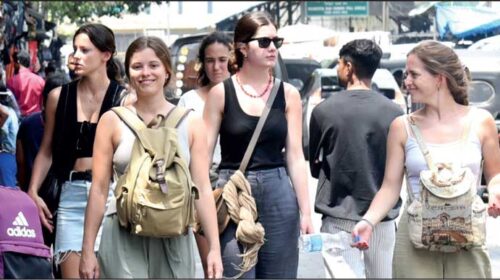 With arrivals surpassing the 100,000 mark in the first 26 days of March, Sri Lanka’s tourism industry has welcomed over 300,000 visitors in the first quarter, starting 2023 on a positive note.
With arrivals surpassing the 100,000 mark in the first 26 days of March, Sri Lanka’s tourism industry has welcomed over 300,000 visitors in the first quarter, starting 2023 on a positive note.
This is also the first time Sri Lanka’s tourism industry recorded over 100,000 tourist arrivals in three consecutive months after 2019.
Led by Russian travellers, during the first 26 days of March, a total of 105,714 tourists arrived in the country, propelling the cumulative figure to 315,898 continuing the growth momentum and boosting hopes for a good year. The growth in the first quarter (with a few days remaining) of tourist arrival is over 10.7% compared to the same period last year, but still 55% lower than the first quarter of the benchmark year 2018.
Russia leads as the top source market, reflecting 21% or 22,038 of total arrivals during the first 26 days of March followed by India with 15% or 15,695, the United Kingdom with 8% or 8,555, Germany with 8% or 8,256, and the US with 5%, provisional data released by the Sri Lanka Tourism Development Authority yesterday noted.
“Sri Lanka’s tourism industry has made a strong comeback in 2023 after a series of major setbacks from 2019. The respect and tribute of it should go to all stakeholders of the industry for all their dynamic and steadfast commitment to overcoming the challenges. I salute their dedication and efforts,” Tourism Minister Harin Fernando told the Daily FT.
He also said that the National Tourism Policy blueprint will also be implemented soon to set out consistent policies and standards to boost Sri Lanka’s tourism industry to its next stage of growth in 2024.
“We are excited about 2023, as plans are underway to make Sri Lanka a year-round destination,” the Minister added.
Tourism accounts for close to 5% of Sri Lanka’s economy. The industry is hopeful of achieving 1.55 million visitors and an income of $ 2.88 billion in 2023.
With Sri Lanka Tourism not opting for a global communication blitz in 2023, however, it will focus on nine key markets identified as India, Russia, China, the UK, France, Germany, the Middle East, and Nordic countries. The MICE tourism segment is earmarked as a key segment Sri Lanka looks to explore this year to push the numbers and earnings.
Analysis opined that the continuous positive publicity at the global level was also a major factor for the boost in arrivals post-political instability just last year.
McKinsey mantra for Sri Lanka
- McKinsey Senior Partner Chair of Insights and Ecosystems Sven Smit moots likely Indian century ahead and says strategically located Sri Lanka stands to gain
- Describes Sri Lanka’s potential as solid and this could be realised with right strategies, competence and competitiveness and make Sri Lanka grows better and bigger than it had in the past
- Stresses Sri Lanka must find its own positioning in the region and globally
By Nisthar Cassim
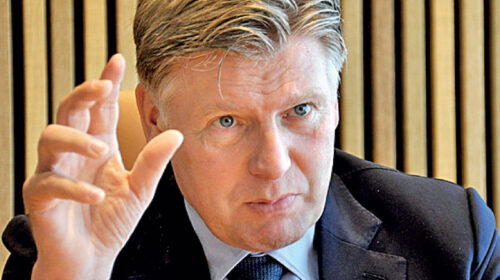 Renowned global management consulting firm McKinsey is urging Sri Lanka to use the strategic geographic location effectively and benefit from India’s rise whilst following best practices of successful emerging economies.
Renowned global management consulting firm McKinsey is urging Sri Lanka to use the strategic geographic location effectively and benefit from India’s rise whilst following best practices of successful emerging economies.
“If the Indian century comes through, whoever is related to that will have benefits,” emphasises McKinsey Senior Partner Chair of Insights and Ecosystems Sven Smit who is also the Chair of the McKinsey Global Institute, the firm’s business and economics research arm.
“Are you close to something that grows?” queried Smit in an interview with the Daily FT during a recent visit to Sri Lanka. “One of the endowments of Sri Lanka is location. I come from the Netherlands, where the port of Rotterdam is. To what degree can Sri Lanka be the port of India or a port? Even if you’re a port to India, that will make a big difference,” he added, reinforcing that Sri Lanka stands to benefit from India’s rise.
Smit stressed when something as big as India starts to move at a different pace, it pulls its surroundings and Sri Lanka with right strategies, competence and competitiveness, can grow better and bigger than it had in the past.
He stresses Sri Lanka needs to ask itself whether the country is making what India needs or be the logistics hub for what it needs or ships out. McKinsey executive said that at the potential level Sri Lanka is solid and this could be realised by the right strategies. “The more you have the best business policies and practices the better it is,” said Smit and listed among them were fiscal discipline and currency stability along with a dynamic agriculture, manufacturing and services sector including tourism and logistics.
“Sri Lanka has a natural endowment to do agriculture and better agriculture is needed in the world, including productivity. Sri Lanka could be one of the more productive locations,” said Smit who is a member of McKinsey’s global leadership team, overseeing the firm’s knowledge development.
He added that being an island nation, Sri Lanka also has a natural attraction to tourism which has great potential.
He stressed that “Every country will need to find its position.” According to Smit, a country can only get one or two words in the mind of the world. “From a brand perspective of New York it is Wall Street and the Big Apple. Singapore has its financial centre. Sri Lanka can put one or two words. Is it the port, is it tourism, or is it a manufacturing place? This doesn’t mean that you should do all four, but one or two of those should be the things that the world will think or remember when it is comes to Sri Lanka.”
“What always works is if you have one or two strong winners, it will pull everything up. If you have an industry that’s big and strong ‒ be it manufacturing, tourism or ICT, and for that you need basic services, and then when that engine runs on the platform of that, another engine can run. Countries are going to be known for what works the best,” Smit added.
https://www.ft.lk/top-story/McKinsey-mantra-for-Sri-Lanka/26-746781
Sri Lanka to seek competitive bids for state asset sales
 ECONOMYNEXT – Sri Lanka will adopt a competitive bidding process for asset sales and will shortly call for expressions of interest from transaction advisors to support the divestment program, the head of the state enterprise re-structuring unit Suresh Shah said.
ECONOMYNEXT – Sri Lanka will adopt a competitive bidding process for asset sales and will shortly call for expressions of interest from transaction advisors to support the divestment program, the head of the state enterprise re-structuring unit Suresh Shah said.
All assets will be sold through a competitive bidding process and no unsolicited bids will be accepted.
The first step will be to select transaction advisors.
“We will work with development financial institutions and qualified and experienced consultancy firms to provide transaction advisory services,” Shah said.
“After the transaction advisors study the companies, we will call for bids.”
Sri Lanka’s cabinet of ministers has given the go ahead for the sale of SriLankan Airlines including Sri Lankan Catering which has large volumes of debt from losses after it was taken back to state management from Emirates.
Sri Lanka Telecom, Sri Lanka Insurance Corporation, Litro Gas Lanka Ltd/Litro Gas Terminals Pvt Ltd, Canwill Holdings Pvt Ltd which owns the Grand Hyatt building, Hotel Developers (Hilton) are also in the list.
The transaction advisors will assist in “sell-side due diligence, valuation, data room creation, transaction strategy and marketing” of the firms, according to a statement from the re-structuring unit.
All assets will be sold through a competitive process. Both domestic and foreign investors could bid.
“We will not accept unsolicited bids,” Shah said. “We will follow a transparent and credible process. Whoever want to make a bid will be given the opportunity. We will call for bids both locally and internationally.”
A decision to list any unlisted firms has not has not been taken as yet but will be considered, he said.
In addition to getting immediate cash from asset sales, helping boost cashflows, the government will also bet a share in any higher future profits under private management through corporate income tax, not counting turnover taxes.
The debt of SriLankan Airlines will be re-structured before a divestiture.
According to IMF program related documents, a plan to re-structure debt of several state companies including SriLankan Airlines has to be approved by cabinet by June 2023 under a structural benchmark involving a World Bank program.
By September residual dollar loans would be transferred to the government. (Colombo/Mar28/2023)
Sri Lanka to seek competitive bids for state asset sales
Karaikal-KKS ferry service to commence on 29 April
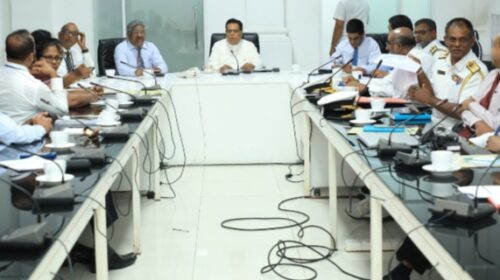 Minister of Ports, Shipping and Aviation, Nimal Siripala de Silva said the first ferry line, of the new ferry service, to be operated between Karaikal Port in Puducherry, India and Kankesanturai (KKS), is scheduled to call at the KKS Port on 29 April.
Minister of Ports, Shipping and Aviation, Nimal Siripala de Silva said the first ferry line, of the new ferry service, to be operated between Karaikal Port in Puducherry, India and Kankesanturai (KKS), is scheduled to call at the KKS Port on 29 April.
The Minister disclosed this information at a discussion, with the stakeholders of this new ferry service, held recently at the Ministry.
A passenger terminal was built at the KKS Port as part of infrastructure development for the new ferry service. The Sri Lanka Ports Authority (SLPA) has provided a financial facility of Rs 144 million for construction carried out by the Sri Lanka Navy.
The initial construction phase of the passenger terminal has already been initiated by the SL Navy and will be handed over to the SLPA by the second week of April, following completion.
The ferry service owners at the discussion revealed that USD 50 will be charged from a passenger for a one-way trip and a baggage allowance of 100 kg will be permitted.
A ferry will carry 150 passengers at a time and will take around 4 hours to reach KKS from Karaikkal Port. Ferry service owners emphasised that only day time services will be operated initially. The Minister said as the ferry service has been launched, any entrepreneur from Sri Lanka or India is welcome to invest.
The Minister also said besides the launch of the new ferry service, the expansion activities of the KKS Port will be expedited.
“As the credit line from India for this construction is insufficient, an additional credit facility of USD 16 million has been requested from the Indian Exim Bank,” the Minister said.
Karaikal-KKS ferry service to commence on 29 April